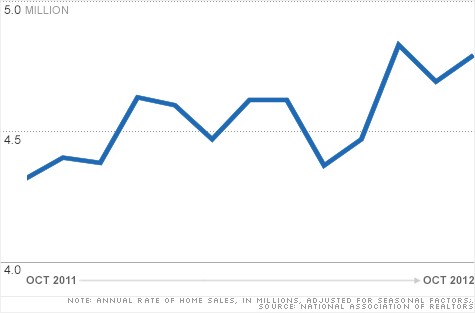 Photo: Thinkstock
Photo: Thinkstock
Low mortgage rates: everyone wants them, but not everyone can have
them. And with rates dropping to record-setting lows, it's no wonder why
they're such a hot commodity.
Mortgage rates hit record-setting lows at well under the 4-percent
mark in the first week of October 2012. That's when Freddie Mac, the
government-sponsored home financing corporation, reported the average
30-year fixed-rate mortgage (FRM) average dipped to 3.36 percent.
Unfortunately, not everyone will be able to take advantage of these low interest rates.
Why not? According to Brownie Stanisch, a senior loan consultant from
Sherman Oaks, Calif., the qualifying guidelines for loan approval are
tougher than ever due, in part, to the rising amounts of home
foreclosures.
"Every time a property is foreclosed, lenders look at what caused the
foreclosure," Stanisch says. "If they look at 10 property foreclosures
and eight of them were homes (purchased by borrowers) with low credit
scores or a low down payment, lenders feel they have got to be more
stringent."
Want to find out if you could score a 4 percent mortgage rate or
less? Consider these six key factors that mortgage experts say could
help you get a low rate.
Factor #1 - Good Credit
Nothing moves the needle in terms of an interest rate more than a borrower's credit rating, mortgage experts say.
"Good credit is mandatory," says Laura Hertz, a loan officer based in
Sherman Oaks, Calif. "People think no credit is good credit, but no
credit is no credit."
A primary form of determining one's credit "rating" in the eyes of
lenders is a borrower's FICO score, a numerical calibration of one's
credit risk (invented in the 1960s by a company called Fair Isaac).
[
Got a good credit score? Click to compare mortgage rates now.]
According to myFICO, the consumer division of Fair Isaac, lenders use
your credit score to determine how much money you can borrow and at
what interest rate. FICO scores range from 300 (on the bad end) to 850
(on the great end).
"It's important to maintain good credit," Hertz says. "A score of 640
is an OK credit score, but 740 and above will get you the best rates."
To review your credit report, the Federal Reserve System, which
oversees national monetary policy and the banks, suggests ordering a
copy from www.annualcreditreport.com.
Factor #2 - Good Down Payment
Getting an interest rate under 4 percent truly is a game of
percentages. The mortgage rate you receive is likely to be inversely
proportional to your down payment - that is, the more you put down, the
lower your interest rate tends to be, according to Hertz.
"To get the very best rate, you have to have a 30 percent down
payment," Hertz says. "A 20 percent down payment is good, and that can
be worked with for a better rate."
[
Are you able to put down a good down payment? Click to compare mortgage rates now.]
But is a 20 percent down payment the starting point for interest rates under 4 percent? Not necessarily.
Hertz says down payments of 10, 5, or even 3.5 percent are good
amounts, too, but borrowers might have to pay additional fees or
purchase private mortgage insurance (PMI) to offset risk issues such as
poor credit.
The Mortgage Insurance Companies of America defines PMI as a measure
lenders use "for protection in case the homeowner fails to make his or
her (mortgage) payments."
Borrowers with a low down payment, according to Hertz, might have to
include PMI with their loan package in order to get an interest rate
under 4 percent.
"If you do 20 percent down, you don't end up with high PMI," Hertz says.
Factor #3 - The Right Lender
Getting a loan with an interest rate below 4 percent depends heavily
on finding a lender or broker who has your best interest at heart. But
how can you find the right lender?
For starters, you need to shop around and consider recommendations from people you trust, Hertz says.
"Listen to your realtor," Hertz says. "Get different business cards
and different references. Almost every one of my clients is a referral
from somewhere else."
[
Ready to shop around? Click to compare mortgage rates now.]
You also must be prepared to ask lenders questions about their track
record and performance levels, Hertz says. Among the questions you might
consider asking include:
- How quickly do your loans close?
- Do you have references from people in the area I can call?
- Does your company have a good rating?
- How much experience do you have?
- Are you in communication with the underwriter (the person who approves or rejects loan requests)?
The
answers to these questions will hopefully help you find a lender that
can improve your chances of getting an interest rate below 4 percent.
"You have to find a lender who has the time and patience to deal with
any issues you might have," Stanisch says. "They need to be able to
advise you on whether you can do anything to improve your pricing
conditions, so don't wait until you find a house to start the process."
Factor #4 - Stable Job History
How is your employment history? If you have been off and on the job
for an extended period of time, that could affect whether your interest
rate will find itself near the record-setting low marks, mortgage
experts say.
Even with a good income, you'll still need to prove that your job
history bodes well for your future employment, thus enabling you to
borrow at a lower interest rate. The key word here: documentation.
"Lenders will definitely decline loans if you can't provide
documentation or back up what you are telling them," Hertz says. "They
don't take things at people's word unless they can be backed up."
[
Think you have what it takes to land a low mortgage rate? Click to compare mortgage rates now.]
Hertz says you can expect lenders to ask you to sign a Form 4506 from
the Internal Revenue Service to request a transcript of your tax
return. You'll likely also be asked to provide pay stubs and bank
statements to verify your income and assets.
People who are self-employed, receive other types of taxable income,
or earn substantial commissions or bonuses have to be diligent in
keeping track of their salary history, according to Hertz. Lenders tend
to scrutinize job history the way Sherlock Holmes works a case, leaving
no stone unturned.
Hertz recommends having the following documentation in good order to show lenders:
- Two years of tax documentation
- Any bonus check stubs from the previous year
- The most recent month of pay stubs
- Two forms of legal identification
- Two months of bank statements
"If
your work hours are not guaranteed, that's a big problem," Hertz says.
"If you're somebody who has a big part of their income that's a bonus or
a sales rep whose income is decreasing, they might not qualify for the
loan. You have to show your income is increasing or staying the same."
Factor #5 - Few Liabilities
The amount of debt you owe can play a significant role in whether you
get an interest rate near the record-setting lows. If your financial
liabilities or debts are too much in comparison to how much income you
make, lenders might balk at giving you a rate below 4 percent.
The Federal Housing Administration (FHA), the government-sponsored
mortgage financing entity, describes these debt ratios as loan
requirements based on whether potential borrowers are "in a financial
position that would allow them to meet the demands that are often
included in owning a home."
A debt ratio is an indicator that measures the proportion of debt an individual has compared to their assets.
[
Are you ready to score a low mortgage rate? Click to compare rates from multiple lenders now.]
For people with a lot of credit card debt, for example, Stanisch says
you want to pay off balances or get them as low as possible before you
attempt get a home loan with an interest rate under 4 percent.
Here are some other ways Stanisch and Hertz say you can improve your debt-to-income ratios:
- Lower your liabilities or debts, such as paying off a car
- Increase your income, perhaps by getting a second job
- Some combination of both lowering debt and improving income
Factor #6 - Loan Type
Choosing a loan type could spell the difference between getting an
interest rate that's well below 4 percent and one that hovers high above
it. So which way do you go - a conventional loan or one that's financed
by a government-sponsored program?
Depending on your situation and the loan terms, Hertz says you might get a better rate with a government-backed loan.
"The FHA's actual rate can be a bit lower than a conventional loan,"
Hertz says, "but the mortgage insurance is often higher than a
conventional loan."
[
Shop around for the best mortgage loans and rates. Click to get started.]
Hertz says it's important for borrowers to be aware that getting an
FHA loan can require an upfront insurance premium and another monthly
premium based on the loan amount. But if having an interest rate under 4
percent is important to you, paying the additional premiums might be
worth it.
"The upfront mortgage insurance and monthly (premiums) are aversions,
but most Fannie and Freddie loans are under 4 percent," Hertz says.
 Foreclosure sale image via Shutterstock.
Foreclosure sale image via Shutterstock.

